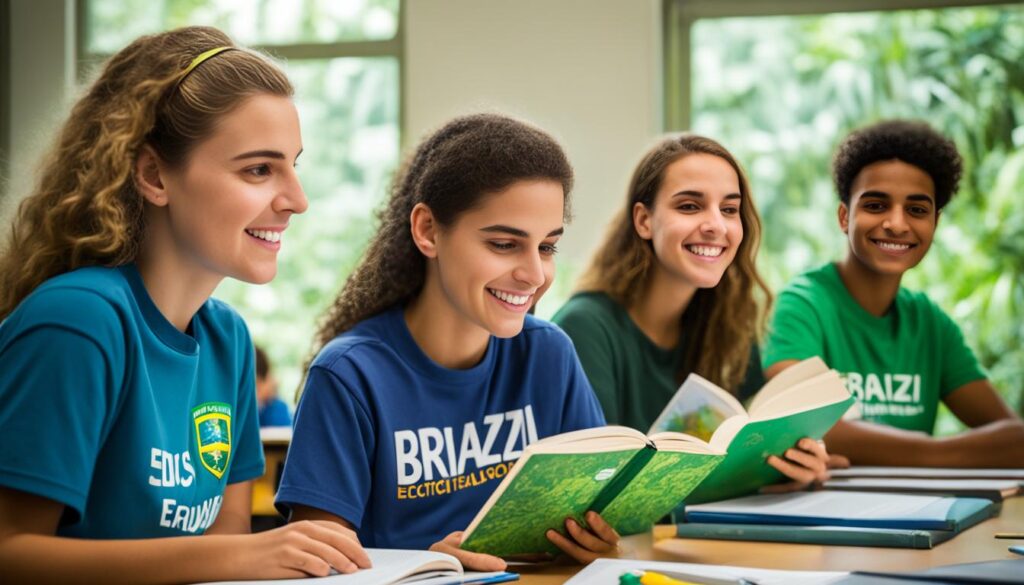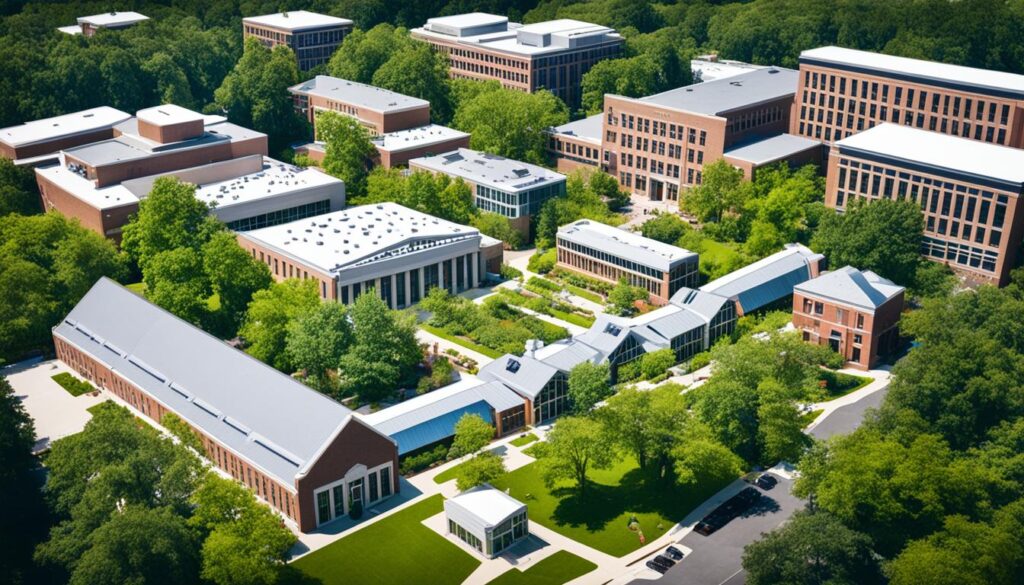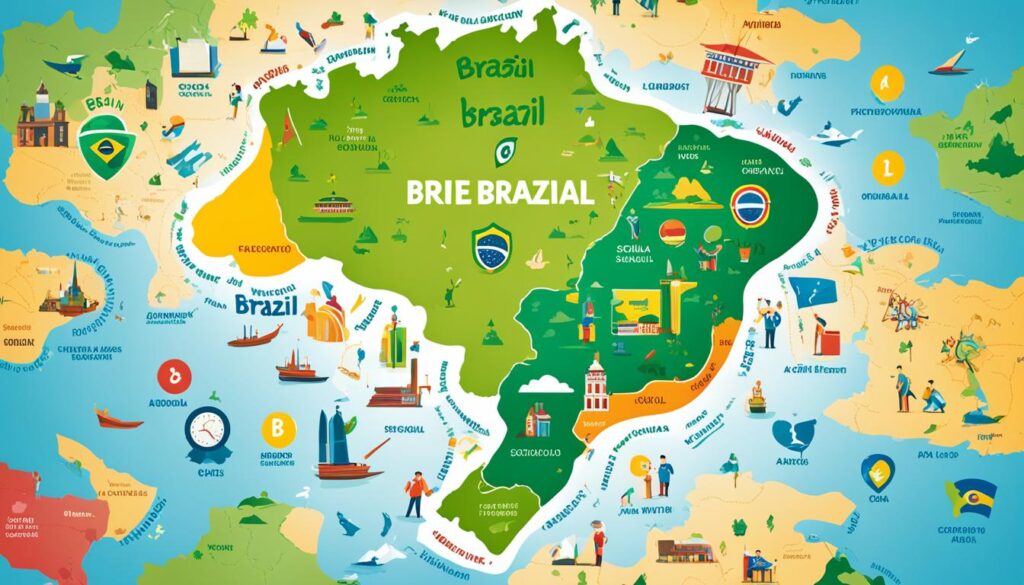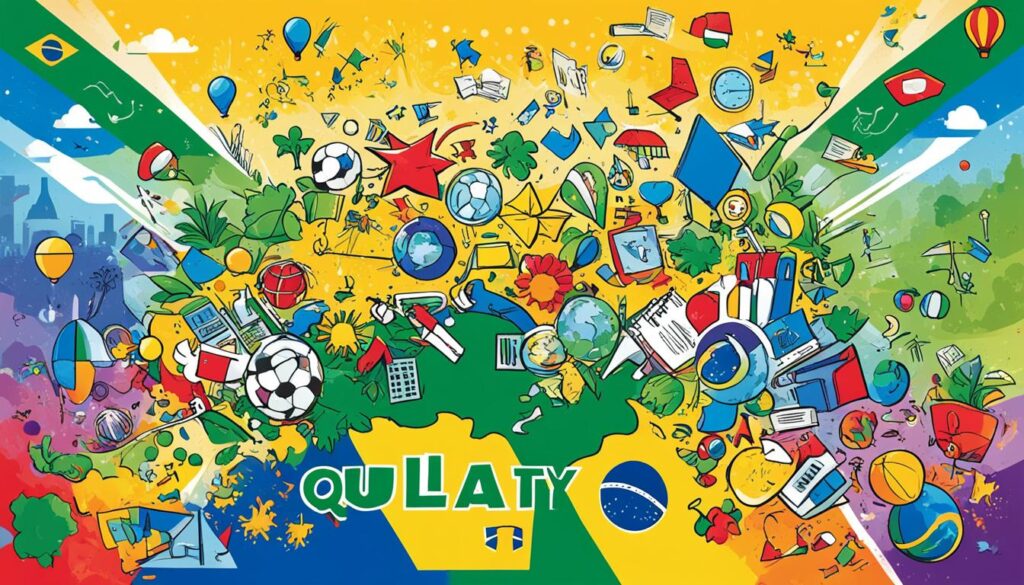Education in Brazil encompasses a diverse landscape, with various schools in Brazil offering unique approaches to learning. The search for the best options is often complicated by the demand for quality education, highlighted by significant waiting lists at many top-rated schools. This article explores the factors influencing educational quality and provides insights into the leading institutions, including international schools that cater to expatriates. As the largest country in South America, Brazil is home to over 210 million people and features a rich tapestry of languages and cultures, with Portuguese as its official tongue. It is vital to consider location and commute times when assessing the best school in Brazil to meet your educational needs, particularly in bustling cities like São Paulo where options abound. For further details on the top-rated schools in São Paulo, you can check out this [comprehensive list](https://www.international-schools-database.com/in/sao-paulo/top-schools-in-sao-paulo) of international schools that cater to diverse educational demands.
Key Takeaways
- Brazil’s education system is diverse, with options ranging from public to private and international schools.
- Quality education is crucial for students’ growth, impacting their future opportunities.
- Top-rated schools often have waiting lists, so early applications are advisable.
- International schools in Brazil provide various curricula, appealing to expatriates and locals alike.
- Location and accessibility play a significant role in choosing the right school in Brazil.
Unlock Investment Opportunities Abroad!
Introduction to Education in Brazil
The Brazilian education system presents a structured approach comprising various levels including early childhood, primary, secondary, and higher education. It aims to foster educational growth across diverse demographics. Despite notable improvements such as increased enrollment rates, the country still grapples with significant challenges in education. The literacy rate stands at 94.6% for 2023, with notable disparities between males at 94.3% and females at 94.8%1. Brazil ranks at 79 in the UN’s Education Development Index, indicating that it remains behind many of its Latin American counterparts1.
Overview of the Brazilian Education System
The landscape of public education in Brazil reveals that roughly three-fifths of Brazilians have only four years of schooling or less2. Even though approximately 90% of children aged 7–14 are enrolled in school, less than three-fifths of students aged 15–17 continue their education2. Enrollment in secondary schools surged dramatically during the late 20th century, and university attendance has seen substantial increases in the 21st century, although a small portion of those aged 18–24 are actually attending university2. One notable statistic is that about three-fourths of undergraduates in Brazil are enrolled in private higher educational institutions2.
Challenges Facing the Education Sector
Despite growing public investment in education, which rose from 10.5% of total public expenditure in 2000 to 16.8% in 20093, Brazil continues to face substantial challenges in providing equitable access to quality education. Over a third of Brazilian children are not in school, and among those who attend, issues like high dropout rates and a lack of learning resources prevail1. The economic landscape further complicates access, as nearly two-thirds of the working population earns two minimum salaries or less2. Moreover, approximately 50,972,610 students are enrolled in basic education with the majority, 43,053,942, attending public schools3.
Importance of Quality Education in Brazil

In Brazil, the emphasis on quality education has significant implications for both individual and national development. Addressing educational challenges can lead to enhanced economic growth and provide essential benefits of education for disadvantaged groups.
Impact on Economic Growth
A strong education system is a foundational element for improving economic growth. Studies indicate that Brazil’s access to quality education scored 5.1 out of 10 in 2022, showing a slight increase from the previous year4. This progress highlights the country’s potential to enhance productivity, as educated individuals tend to drive innovation and productivity within the workforce.
Furthermore, the Brazilian population witnessed a remarkable literacy rate of over 99.2%, positioning the nation among top performers in Latin America when it comes to basic education5. Education equips individuals with the skills necessary to contribute effectively to the economy, thus fostering economic development that can alleviate poverty.
Long-term Benefits for Students
Investing in quality education yields long-term benefits for students, particularly in terms of future earnings. Research demonstrates that each additional year of preschool education correlates with a 15% boost in future income5. Access to education impacts marginalized communities profoundly, creating opportunities that help elevate families out of poverty and contribute to societal upliftment.
As Brazil continues to tackle educational inequalities, particularly in smaller municipalities and among disadvantaged groups, the focus on improving educational quality stands critical for a prosperous future. With approximately 7 million students enrolled in various forms of higher education institutions across the country5, the potential for growth through education remains promising.
Chapel School: A Leading International School in Brazil

The Chapel School, founded in 1947 by the priests of the Oblates of Mary Immaculate, has grown into a highly regarded institution in São Paulo, Brazil. The school’s primary mission is to provide a comprehensive education that emphasizes Christian values, ensuring that students develop into responsible and informed individuals. This commitment sets the Chapel School apart from other international schools in Brazil, making it an attractive option for families seeking quality education.
History and Mission
Initially established to serve English-speaking Catholic families, Chapel School has expanded its reach and now accommodates a diverse community of approximately 700 students from 30 different nationalities. With a student body comprised of 67% local and 33% international students, the school creates a rich multicultural environment conducive to learning6. The school’s mission focuses on the overall development of its students, integrating academics with the cultivation of moral and ethical values that shape their character.
Programs Offered and Diplomas Available
Chapel School offers a robust range of educational programs, including American, Brazilian, and International Baccalaureate diplomas. The teaching staff consists of native English-speaking teachers from Brazil, the United Kingdom, Australia, Canada, and the United States, which fosters a rich learning environment for all students. Starting each day at 8 am and finishing at 3:10 pm, the school ensures a structured approach to education, with 100% of its graduates pursuing further education6.
Additionally, the school boasts modern facilities, including a gym and a soccer field, supporting a wide range of extracurricular activities. Chapel School competes in multiple sports tournaments like Big 8, Big 4, and Little 8, promoting teamwork and physical fitness among students6. This holistic approach to education places Chapel School among the leading international educational institutions in Brazil, dedicated to academic excellence and character development.
School in Brazil: Examining the Best Options

In selecting the best schools in Brazil, families often consider various aspects that can significantly influence educational outcomes. The criteria for selecting schools include curriculum quality, faculty qualifications, school infrastructure, extracurricular activities, and academic results. Understanding these factors is essential to make informed choices when evaluating notable educational institutions.
Criteria for Selecting the Best Schools
When examining the best schools in Brazil, key criteria emerge that help determine their quality:
- Curriculum : A school should offer a comprehensive curriculum aligned with national standards while integrating innovative teaching methodologies.
- Faculty Credentials : Highly qualified educators contribute to enhancing student learning experiences and overall school performance.
- Facilities : Access to modern facilities, such as libraries, laboratories, and sports areas, can enrich students’ educational journeys.
- Performance Metrics : School rankings and student success rates often reflect the efficacy of educational practices.
- Student-Teacher Ratios : Smaller class sizes typically promote individualized attention and support for students.
Unlock Investment Opportunities Abroad!
Noteworthy Schools and Their Distinctions
Among the best schools in Brazil, certain institutions stand out due to their exceptional offerings:
| School Name | Location | Special Programs | Awards |
|---|---|---|---|
| Chapel School | São Paulo | International Baccalaureate | Ranked Top International School |
| Colégio Bandeirantes | São Paulo | Advanced Placement | Excellence in Academics |
| Escola Graduada | São Paulo | IB Diploma | Best School Environment |
Choosing the right institution among the best schools in Brazil can significantly affect a child’s future. Families should prioritize their needs while considering these criteria for selecting schools to ensure a solid educational foundation.
Private vs. Public Education in Brazil
The ongoing debate surrounding private and public education in Brazil highlights the critical need for equitable access to quality learning environments. Many families gravitate towards private schools due to the perception of superior facilities and smaller class sizes. Private schools Brazil often offer a broader range of programs and personalized attention that can enhance a student’s learning experience. According to recent data, 82% of the top 10% of schools scoring the highest in ENEM are private institutions, while only 18% are public schools7. This disparity raises questions about the quality of education available to students across different socioeconomic backgrounds.
Exploring Private School Benefits
Private education in Brazil showcases significant advantages regarding investment and resources. International schools, which number more than 40, typically serve Brazilian families who constitute over half the student body. Tuition at these institutions can reach as high as R$12,000 per month, which underscores the exclusivity of this educational option8. However, it is crucial to recognize that such choices are often not attainable for low-income families, which exacerbates existing inequality in the education system.
The Role of Public Education and Its Challenges
In comparison, public education serves the majority, with up to 80% of students enrolling in state schools. Unfortunately, public education challenges are evident in the significant shortcomings faced by many institutions. For instance, only 4.5% of public schools have all the infrastructure mandated by law, leading to overcrowded classrooms and inadequate facilities7. During the COVID-19 pandemic, around 47.2% of girls in public schools stopped receiving food, further increasing dropout rates7. The minimum monthly wage for public school teachers, at approximately R$2,886.24 ($569.91), remains significantly below the estimated cost of living, impacting teacher quality and retention7.
Addressing these public education challenges is essential for fostering a more equitable learning environment that serves all students effectively. While private institutions may offer a pathway to educational success, the systemic issues within public schools must be prioritized to ensure that every child in Brazil has access to quality education. An ongoing national discourse highlights the need for regulation and equitable policies to enhance both public and private education systems across the country. For further insight on this topic, consider exploring how public education systems need strengthening to make a difference.
Impact of Curriculum in Brazil on Student Success

The type of curriculum adopted in Brazil plays a significant role in shaping educational outcomes for students. With the implementation of the Base Nacional Comum Curricular (BNCC), attention has shifted towards enhancing learning standards across the board. The introduction of the International Baccalaureate (IB) program has sparked discussions about global educational standards and a more comprehensive approach to student development. The IB curriculum encourages critical thinking and international awareness, contrasting with the national curriculum that is sometimes criticized for its rigidity and lack of adaptation to diverse learning needs.
International Baccalaureate vs. National Curriculum
The International Baccalaureate stands out for its focus on creating well-rounded individuals prepared for global challenges. Over 15,300 schools in Brazil are striving for high-quality instruction, with frameworks that aim to elevate educational standards, particularly through initiatives supported by collaboration with local governments and educational organizations9. Despite improvements, student performance still trails behind that of wealthier nations. The national curriculum faces challenges, including high dropout rates and a distinct lack of performance incentives for teachers, who often come from lower-achieving backgrounds10. These factors contribute to a complex educational landscape where many students do not reach their full potential.
Focus on Early Childhood Education
Investing in early childhood education is essential for improving overall student success. Research indicates that children who participate in high-quality preschool programs develop better academic and social skills as they progress through their education11. Programs such as Formar and Programa de Alfabetização em Regime de Colaboração have impacted around two million students, reinforcing the importance of early learning initiatives9. As Brazil grapples with educational disparities and performance issues, enhancing early childhood education systems can lead to significant long-term benefits for the next generation. The challenges evident in Brazil’s education sector require focused efforts, particularly in ensuring that foundational years are strong to create pathways for academic success.
Conclusion
In summary, the journey towards achieving quality education in Brazil presents a complex array of challenges and opportunities. The need to enhance educational standards across both public and private institutions is crucial, as it directly influences students’ potential for future success. Schools such as Chapel School highlight the importance of diverse curricula and the positive educational impact that international standards can provide, ensuring that the quest for the best schools continues to evolve.
Moreover, addressing socio-economic disparities and focusing on early childhood learning initiatives will play a significant role in shaping the educational landscape. In Brazil, efforts to improve the Basic Education Development Index (IDEB) and ensure a minimum score of 6 by 2022, serve as clear indicators of the commitment to quality education Brazil needs. A comprehensive approach that combines rich curricula, teacher training, and equitable resource distribution is essential to foster an environment where all students can thrive.
Ultimately, the long-term benefits of a robust education system extend beyond individual achievement and deeply influence national growth and social equity. With a deeper understanding of the factors affecting educational performance and the ability to adapt policies and curricula accordingly, Brazil can aspire to cultivate an educational framework that not only competes globally but also uplifts all its citizens.
Learn more about Brazil’s education statistics12.
Unlock Investment Opportunities Abroad!
FAQ
What are the main types of schools in Brazil?
How does the Brazilian education system differ from other countries?
What factors should parents consider when selecting a school in Brazil?
Why is education considered vital for economic growth in Brazil?
What challenges do public schools in Brazil face?
How does the International Baccalaureate (IB) program benefit students in Brazil?
What are the benefits of early childhood education in Brazil?
What are some of the best international schools in Brazil?
Source Links
- https://en.wikipedia.org/wiki/Education_in_Brazil
- https://www.britannica.com/place/Brazil/Primary-and-secondary-school
- https://www.brazileducation.info/education-system
- https://valorinternational.globo.com/economy/news/2024/04/01/brazil-scrapes-through-in-quality-education-index.ghtml
- https://www.uopeople.edu/blog/10-facts-about-education-in-brazil/
- https://www.international-schools-database.com/in/sao-paulo/chapel-school-sao-paulo
- https://assembly.malala.org/stories/how-lack-of-funding-is-affecting-public-education-in-brazil
- https://www.talkeducation.com/news/brazil-s-schooling-system-everything-you-need-to-know-
- https://fundacaolemann.org.br/en/advancing-brazils-education-system
- https://documents1.worldbank.org/curated/en/993851468014439962/pdf/656590REPLACEM0hieving0World0Class0.pdf
- https://www.nature.com/articles/s41562-022-01350-6
- https://www.ncbi.nlm.nih.gov/pmc/articles/PMC7968699/

Comments